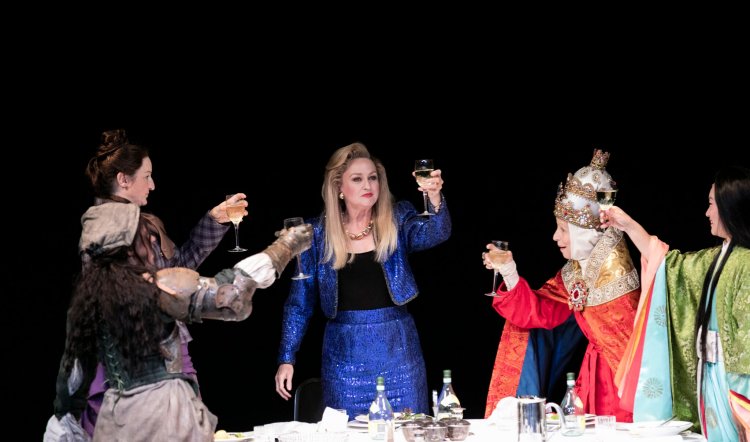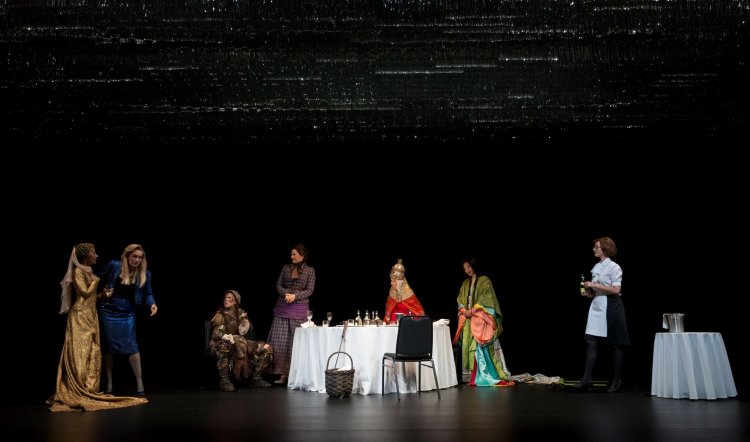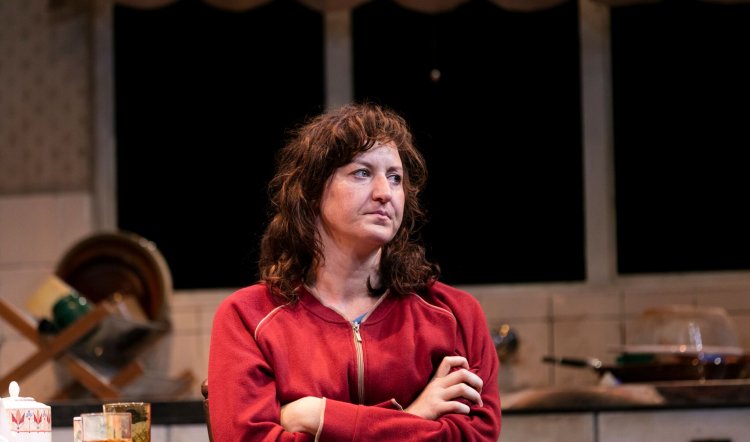
TOP GIRLS
TOP GIRLS, Sydney Theatre Company at the Drama Theatre, Sydney Opera House, 16 February-24 March 2018. Photography by Brett Boardman: above - Contessa Treffone, Kate Box, Helen Thomson, Heather Mitchell, Michelle Lim Davidson; below - the dinner party; below again - Kate Box
In 2018 this is an important play and an important production. Here’s why. In 1982, when Top Girls was first staged, Margaret Thatcher had been in power in Britain since May 1979. She was already well on her way to dismantling and remodelling the social fabric although still not the unstoppable force that would win a third term in 1988 and announce, “there is no such thing as society”. In Top Girls, Caryl Churchill prefigures that to chilling effect.
Thatcher is an invisible yet potent presence at the (in)famous dinner party which opens the play. The occasion is Marlene’s impending elevation to MD of her company, Top Girls, a successful London employment agency. She (Helen Thomson) is celebrating and has invited a guest list from history.
On the face of it, the party is a fantasy, but at the same time it’s a sly poke at the heroic/individualistic style of American feminism as depicted in Judy Chicago’s monumental artwork The Dinner Party. Its reputation had preceded it across the Atlantic and it landed in a north London warehouse gallery in 1984. Meanwhile, the caustically humorous Churchill devised a similar gathering for Marlene, whose power shoulder pads and rigid helmet echoes a real-life Thatcherite, junior cabinet minister Edwina Currie. She who notoriously said, “I'm not a woman. I'm a Conservative.” And she surely lives on in our own Julie Bishop, at very least, as well as in the world of the play’s employment agency.
Director Imara Savage has assembled a fabulous cast to take on this most structurally and technically difficult of plays and steers through it at a dazzling yet thoughtful clip. Each actor takes on two or three roles across a millennium anchored by Thomson’s monstrous, subtle, intelligent, hilarious Marlene.
The dinner party – act one – is fuelled by many bottles of Frascati and the now celebrated but then innovative “slash” dialogue. (Churchill wanted characters to deliberately speak over one another and a forward slash in the script indicated where it should happen.) When it happens it’s rhythmic, apparently – but not – random and effectively heightens meaning. In the course of the dinner it illustrates the then rare phenomenon of women behaving badly (independently); becoming drunk as lords and with tongues as loose as perished knicker elastic.
Marlene’s guests are an eclectic lot: Kate Box is the tartan-clad Victorian lady traveller Isabella Bird whose soft Edinburgh accent conceals a steely resolve to go places where no lady has been before – especially the wrong end of a bottle. Lady Nijo (Michelle Lim Davidson), a 13th century imperial concubine, giggles behind her hand as she dreamily reveals a life as painfully cruel as her formal court kimono is aesthetically glorious.

Come to life from a Breughel canvas is Dull Gret (Contessa Treffone), the stinking rag-clad woman who donned male armour to lead a mob of peasant women to Hell. She stuffs food and drink into her mouth with the determination of the lifelong deprived and, although she says little and most of it profane, she is a riveting presence.
The last to arrive is Patient Griselda (Paula Arundell). Chaucer borrowed her from Boccaccio and adapted her for a role in The Canterbury Tales. She is a sweet-voiced naif plucked from serfdom by the Marquis by whom she had two babies. What happens to them and her in the cause of total obedience makes even the stoic Lady Nijo blanch.
And still they throw back the Frascati, and three courses, waited on by a chic and sober waitress (Claire Lovering). The one exception in the group of relatively well-behaved lushes is Pope Joan (Heather Mitchell). Her boisterous telling of the bawdy legend of her life grows ever more raucous, and is in sharp contrast to her sumptuous papal robes and mitre. Yet neither God nor a rambling discourse in Latin can save her from an ignominious and raffishly funny denouement.
In essence, they are in their different ways, wicked bad and wonderful. The actors and their director pull off an extraordinary feat of theatre in this celebrated sequence. And then come acts two and three.
The production moves forward to the 1980s via a sharply-realised series of simple settings (David Fleischer) and highly effective lighting including total blackouts (Damien Cooper). The range of costumes (Renee Mulder) is outstanding, while the accompanying soundscape (Max Lyandvert) begins with the Stones’ Sympathy For The Devil and thereafter never lets up.
The transition is exhilarating and logical as Marlene anticipates her elevation to the top job. The Top Girls agency is staffed by Paula Arundell, Michelle Lim Davidson and Claire Lovering. They are sassy and variously ambitious young women for whom the Virginia Slims slogan “You’ve Come A Long Way Baby” obviously sank in as they variously puff away.

The only thing missing from their office is a copy of Cosmo for tea break and sex advice. It’s likely however that Marlene has a copy of the mag’s founding editor Helen Gurley Brown’s Having It All on her bedside table. She sure as hell lives by the Gurley Brown dictum, “Don't use men to get what you want in life – get it for yourself.” The former MD’s meek wife (Kate Box) finds this out the hard way. She visits Top Girls to appeal to Marlene’s better, feminine, nature to give up her new job for hubby. It’s a mighty moment.
In a sadder yet still universally recognisable way, so is the appearance of Louise, a middle-aged jobseeker (Heather Mitchell). This dowdy woman has unobtrusively run her workplace for decades. Along the way she’s assisted a generation of young men only to see them leapfrog her desk into management. She’s finally had enough and her rage is palpable, but the young woman interviewing her is unmoved. There’s no room for a loyal, hardworking drudge in Thatcher’s Britain, even though the Iron Lady once said, “If you want anything said, ask a man. If you want anything done, ask a woman.”
The play’s structure is non-linear and, as you may have gathered, non-realistic. The focus switches to the backyard of a down-at-heel council house (public housing) where two girls, Angie and Kit, are avoiding Angie’s mother Joyce (Kate Box). Angie (Contessa Treffone) is a troubled and troubling youth, bubbling with anger and frustration. Kit (Claire Lovering) is both bullied and fascinated by her bestie while Angie’s mother Joyce wearily smokes and contemplates the void of her underclass life.
Joyce is Marlene’s sister. She stayed and struggled on when Marlene left for London and the bright life. If you want to know more about women like Joyce in that decade, read Beatrix Campbell’s Wigan Pier Revisited. It’s no period piece as it’s also a frightening portrait of what happens – and is happening – when social and gender inequality are generated from the top.
The relationship between the sisters is an illustration of the hopeless social fractures in Britain between the haves and have-nots. In that country it was exacerbated by class, in Australia we see it in $30 million mansions within a half hour of chronic unemployment and unaffordable rents. Stuck in the middle are the Angies – ill-educated, uncomprehending and bone-furious at life. Churchill’s back-to-front depiction of a year in the sisters’ lives offers the audience a glimpse into the future as well as raising ugly questions that would be answered in the decades to come.
As Marlene and Joyce wrangle over their lives and choices, the conflict takes on a devastating momentum. The emotional weight carried by Helen Thomson and Kate Box in their extended, powerful exchange is immense and heart-rending. They are first in a company of equals as the thread running through the play is revealed as an umbilical cord. In front of our blind eyes it’s been cut by history and patriarchal hegemony, separating women from their children and from their real potential. Brilliant. Beautiful. As relevant now as it was forty years ago.



